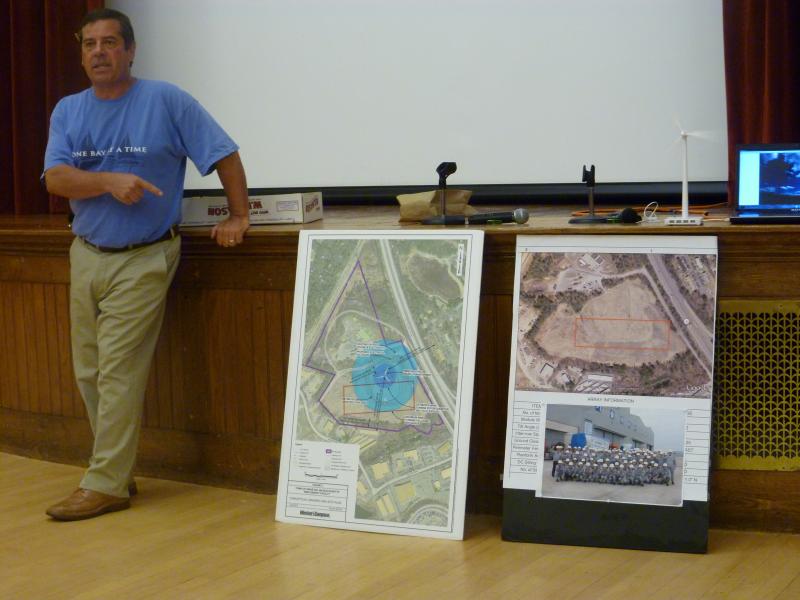Marion still considering green initiatives
The town continued to look into becoming an energy efficient community Monday night during the South Coast Alternative Energy Collaborative meeting at Music Hall.
The Massachusetts Department of Energy Resources’ Green Communities Divisions presented the town with an initiative to conserve and efficiently use energy with hopes of also qualifying for a grant program in August. To be applicable for the grant, the town must adopt a new real estate construction bylaw for special areas of land as well as purchase of fuel-efficient vehicles and establish an energy baseline for buildings. This code would require energy efficiency for new buildings or construction to homes.
Monday night’s meeting featured Mark Beaton, a Kingston Selectman and Chairman of the Alternative Energy Committee for the town. Beaton said Kingston was designated as the first “Green Community” in the Commonwealth in 2010 and has made significant strides for energy conservation and generation. A state-of-the art wind turbine will be erected at the end of November this year on the landfill in town. Beaton also said the town went through extensive energy-saving methods and upgrades to municipal buildings in addition to the turbine.
“We were given $163,00 from this grant program,” Beaton said. In addition to the grant from The Department of Energy, NSTAR provided a grant of $90,000. “And we spent all of it. We saved $102,000 the first year. That’s a 65 per cent return on investment. And we’re looking at an average payback of 1.5 years.”
According to Beaton, Kingston has been investing in “going green” for more than nine years.
“There’s a new revolution going on,” he said, “and it’s against fossil fuel.”
David Pierce, Chairman of Marion’s Energy Management Committee, said the town has long been searching for renewable sources. Last year the committee pushed for a turbine at Great Hill, near Wings Cove. However, the location was largely residential and the neighborhood voiced the turbine wasn’t a viable option. Following the decision to nix the turbine at Great Hill after the spring Town Meeting, the committee turned its focus to land at the Old Rochester Regional Junior High and High School complex. Yet poor location, as well as low thrust readings, put the project on hold.
“As a committee, [looking for a potential area] is the point of becoming a Green Community. The building codes are already in place. There could be come monies coming forward if we became a Green Community. With the event in mind that things continue to go forward, we will be presenting items at Town Meeting.”
Norm Hills, secretary of the Marion committee, said everything is still in infancy.
“We are looking at what will be required to become a Green Community. We sent a letter to the Selectmen asking for their support. We’re really in the infancy of what we’re going to do. The first thing is to do studies on how much energy is being used and where it’s being used before we can move forward.”
One of the criteria to being applicable for grant money is determining an energy baseline. Beaton said this could easily be done through NSTAR.
Two more aspects that have brought some attention are the adoption of a stretch code and new zoning bylaws. If a town is to be considered for grant money, it must provide zoning for the as-of-right siting of renewable energy projects. This means a special permit is not required. The stretch code is an energy-efficiency requirement for new residential, commercial and industrial construction. Beaton said, however, the stretch code has already been passed through state legislature and enacted.
“The stretch code is now the code for the Commonwealth,” he added. “The only expense to a homeowner is the Home Energy Ratings test. People would love to have that information when they’re building a home.” The test provides information on efficiency levels in homes and ways to save money.
Resident Mauk Hudig had concerns about the zoning laws.
“You give up the privilege [of special permits]. I don’t like the bypass of zoning in order to accelerate green projects.”
Beaton said it is up to the town to find the right piece of land.
“Everyone has to know where [the zoned land] is. You have to do your background work. We created a “wind overlay” district. This is a district available to the town for wind projects. The town had to approve the zoning before this.”
Hudig also asked if the town could create these initiatives without becoming designation as a Green Community.
“There’s so much we can do ourselves,” he said. “The payback is the incentive. But there has to be a plan”
Beaton said having the designation greatly improves the chance of obtaining funds not only from the Department of Energy Resources but also from utility companies or at Town Meetings.
Pierce also emphasized the importance of getting a head start on energy conservation.
“The feeling that we are, as a region, behind other countries in terms of production. Particularly in New England, the feeling is that change is never an easy thing for people to deal with. Until we see things in place, we don’t know what’s going to happen.”
Selectman Roger Blanchette said Marion has asked Green Communities Coordinator Seth Pickering to speak at the Oct. 20 meeting with the Buzzards Bay Action Committee in Wareham. Blanchette added no towns along the South Coast are designated as Green Communities.















